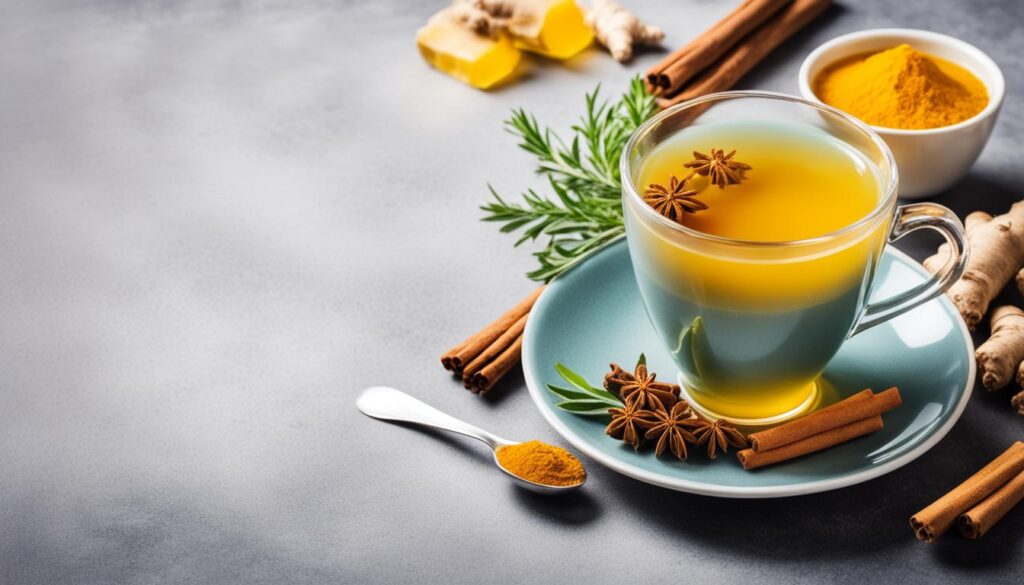For people with rheumatoid arthritis, finding natural ways to ease symptoms is key. This condition causes joint pain and inflammation. Some turn to tea as a possible solution. But, does drinking tea really help with rheumatoid arthritis symptoms?
- Certain compounds in tea, such as polyphenol antioxidants and epigallocatechin gallate (EGCG), may possess anti-inflammatory properties that could help reduce joint pain and swelling associated with rheumatoid arthritis.
- Scientific studies have suggested that regular consumption of tea, particularly green tea, may help alleviate symptoms of rheumatoid arthritis.
- Herbal teas, such as ginger and turmeric tea, may also provide natural relief for joint pain and inflammation.
- Incorporating tea as part of a comprehensive treatment plan, alongside medication and lifestyle changes, may offer a multi-faceted approach to managing rheumatoid arthritis.
- More research is needed to fully understand the extent to which tea can be an effective and reliable natural treatment for rheumatoid arthritis.
Can Drinking Tea Help Ease Rheumatoid Arthritis Symptoms?
Research is showing that green tea might do more than just taste good and calm you down. It could help with rheumatoid arthritis symptoms. This condition causes pain and swelling in the joints.
Green Tea Polyphenols: Natural Anti-Inflammatory Agents
Green tea is full of antioxidants called catechins. Epigallocatechin gallate (EGCG) is the most common and strongest type. These compounds can help reduce inflammation, which might ease rheumatoid arthritis pain.
Studies suggest that green tea’s catechins can lower the production of molecules that cause swelling and pain. This could be a natural way to handle rheumatoid arthritis symptoms.
Epigallocatechin Gallate (EGCG): A Powerful Antioxidant
Epigallocatechin gallate (EGCG) is getting a lot of attention for its health benefits. It’s a strong antioxidant that can help reduce joint pain and swelling from rheumatoid arthritis.
EGCG also stops enzymes that break down cartilage, which could slow down joint damage. This makes green tea a good option for people with rheumatoid arthritis who want to keep their joints healthy.

We need more studies to fully understand how green tea helps with rheumatoid arthritis. But, the current findings suggest it could be a helpful addition to managing this condition.
Herbal Teas: Nature’s Remedy for Joint Pain
Green tea is known for its health benefits, but herbal teas can also help with joint pain from rheumatoid arthritis. Teas made from ginger, turmeric, and chamomile have anti-inflammatory and pain-relieving qualities. These can ease joint pain and stiffness.
Ginger is famous for fighting inflammation and easing joint pain. Studies say ginger tea is a good natural option for rheumatoid arthritis. It helps reduce swelling and gets you moving better. Turmeric, with curcumin, is also a strong anti-inflammatory. It can help manage rheumatoid arthritis symptoms.
Chamomile tea is calming and can be a great addition to natural remedies for rheumatoid arthritis. Its anti-inflammatory and pain-relieving effects help with joint pain. It’s a good choice alongside traditional treatments.
FAQ
Can drinking tea help ease rheumatoid arthritis symptoms?
Yes, studies show that tea contains compounds like polyphenol antioxidants and EGCG. These may reduce inflammation and help with rheumatoid arthritis symptoms.
How do the polyphenols in green tea help with rheumatoid arthritis?
Green tea’s polyphenols, especially EGCG, fight inflammation. They can lessen joint swelling and pain by lowering inflammatory molecules in the body.
What other herbal teas can be beneficial for joint pain relief?
Besides green tea, teas from ginger, turmeric, and chamomile can ease joint pain. They have anti-inflammatory and pain-relieving effects, helping with rheumatoid arthritis symptoms.







